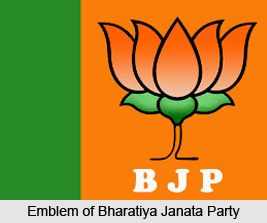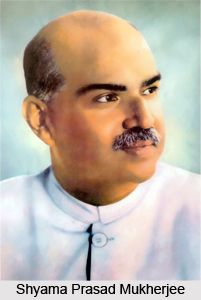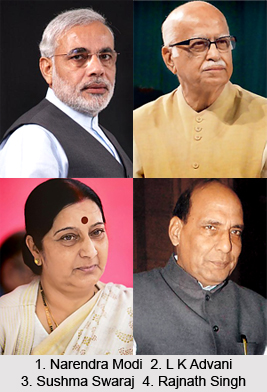 Bharatiya Janata party is also known as Indian People`s party. It is a national political party of India based on Hindus. It is widely regarded to be the political wing of the Rashtriya Swayamsevak Sangha.
Bharatiya Janata party is also known as Indian People`s party. It is a national political party of India based on Hindus. It is widely regarded to be the political wing of the Rashtriya Swayamsevak Sangha.
Bharatiya Janata Party traces its roots to the Bharatiya Jana Sangha which advocated the rebuilding of India in accordance with ancient Indian culture. Bharatiya Jana Sangha was organised by Shyamaprasad Mukherjee in the year 1951. The BJP was formally established in 1980. It achieved its first significant electoral success in 1989, though in 1992 the destruction of the Babri Masjid in Ayodhya caused a backlash against it. In 1996 the BJP formed a short-lived government.
 Two years later the party and its allies formed a majority government with Atal Bihari Vajpayee as Prime Minister. After Atal Bihari Vajpayee, UPA won a major with major victory. In the year 2014, Narendra Modi became the face of BJP and had a grand victory against UPA.
Two years later the party and its allies formed a majority government with Atal Bihari Vajpayee as Prime Minister. After Atal Bihari Vajpayee, UPA won a major with major victory. In the year 2014, Narendra Modi became the face of BJP and had a grand victory against UPA.
The Bharatiya Janata Party, "Indian People`s Party" is one of the two major parties in the Indian political system, the other being the Indian National Congress. Bharatiya Janata Party allocates its official ideology and central philosophy to be "integral humanism". Bharatiya Janata Party as right-wing and "Hindu nationalist party", it advocates social conservatism, self-reliance as outlined by the Swadeshi movement, and a foreign policy centred on nationalist principles during colonial times.
Hindutva Movement
Hindutva or Cultural Nationalism presents the conception of Indian nationhood according to BJP. According to BJP, Hindutva is a nationalist, and not a religious or theocratic, concept. Hindutva Movement is carried out by Dr. Shyama Prasad Mukherjee and later the leaders like Atal Behari Vajpayee, Lal Krishna Advani and many other carried out this concept for social reconstruction. In 1984, L K Advani was appointed as President, and under him the BJP became the political voice of the Ram Janmabhoomi movement. In the early 1980s, the Vishwa Hindu Parishad (VHP) had begun a campaign for the construction of a temple dedicated to the Hindu God, Lord Rama at the site of the Babri Masjid in Ayodhya. Later a civil strife occurred in the year 1992 for Ram janmobhoomi.

Government of NDA
An alliance of all the anti Congress regional parties had formed the government in 1996, but this grouping was short lived and mid-term polls were held in 1998. The BJP contested the elections leading a coalition called the National Democratic Alliance (NDA). On 13 October 1999, the BJP-led NDA, this time without the AIADMK, won 303 seats in parliament and thus an outright majority. The BJP alone had its highest ever tally of 183. At that time, Atal Behari Vajpayee became Prime Minister for the second time, and L K Advani became the Deputy Prime Minister and Home Minister. This NDA government lasted its full term of six years. Its policy agenda included a more aggressive stance on defence and terror as well as neo-liberal economic policies.
Economic Policy of BJP
The economic policy of the BJP has changed considerably since its founding in 1980. There remained a significant variety of financial ideologies within the party. In the 1980s the BJP reflected the thinking of the RSS on the economic policy. It is supported by the promotion of indigenous industries and products, and a protectionist export policy. However, Bharatiya Janata Party supported to the internal economic liberalization. The government of Narendra Modi in Gujarat, which has been in power since 2002, has pursued a strongly neo-liberal and open market agenda, presented as a drive towards industrial development. The policies of Narendra Modi have included extensive privatisation of infrastructure and services, as well as a significant rollback of labour and environmental regulations.
Presidents of BJP
| Year | Name | Term |
| 1980-86 | Atal Bihari Vajpayee | |
| 1986-91 | L. K. Advani | First term |
| 1991-93 | Murli Manohar Joshi | |
| 1993-98 | L. K. Advani | Second term |
| 1998-2000 | Kushabhau Thakre | |
| 2000-01 | Bangaru Laxman | |
| 2001-02 | Jana Krishnamurthi | |
| 2002-04 | Venkaiah Naidu | |
| 2004-06 | L. K. Advani | Third Term |
| 2006-09 | Rajnath Singh | First term |
| 2009-13 | Nitin Gadkari | First term |
| 2013-present | Rajnath Singh | Second term |




















